President Akufo-Addo in a handshake with Kwame Pianim. With him are Dr Edith
Dankwa (left) and Dr Ernest Addison (right). Picture by Gifty Ama Lawson.
President Nana Addo Dankwa Akufo-Addo has started counting the gains his New Patriotic Party (NPP) government has made since assuming the reins of government in January 2017.
Addressing the 8th Ghana Economic Forum (GEF) in Accra yesterday under the theme: “Sustaining Financial and Economic Stability – The Key Priorities,” the President said Ghana’s situation was dire when he assumed office but the pragmatic steps he had taken were yielding positive dividends for the country.
“The macroeconomic situation that my government inherited at the beginning of 2017 was a dire one,” he said but added that “we see an economy that has been growing consistently above seven per cent, and, in the past two years, has been amongst the world’s fastest-growing economies.”
“Indeed, the International Monetary Fund (IMF) projects Ghana’s economy, this year, to have one of the world’s highest growth rates of 7.6 per cent. Inflation for September stood at 7.6 per cent; in single digits, the lowest in over two decades. Our exports are growing healthily; our trade balance account, for the first time in more than a decade, recorded a surplus in 2017, we maintained it in 2018 and we expect to maintain the surplus for this year as well. We have brought the fiscal deficit down to 4.5 per cent,” he stated.
Recalling what he met in 2017, President Akufo-Addo said, “GDP growth at 3.6 per cent at the end of 2016 was the lowest in over two decades. The 2016 fiscal deficit was 9.3 per cent, and inflation at 15.4 per cent. Our external reserves position at the end of 2016 was weak, despite having become an oil exporting country. The banking sector was weighed down by a plethora of poorly capitalized, weak and insolvent institutions, with potentially grave consequences for the entire financial system.”
“Agricultural and industrial activities were down. Unemployment, especially of the youth, was widespread against a background of low incomes and high prices. This was the distressing state of the economy that awaited us in January 2017, despite an ongoing three-year IMF Extended Credit Facility arrangement that had been initiated in April 2015 by the previous Mahama government,” he added.
The President said the situation had improved drastically because of prudent economic management under his stewardship, adding that “our external reserves as of June 2019 stood at 4.3 months of import cover. All our macroeconomic indices are pointing in the right direction, and it comes as no surprise, therefore, that today Ghana is the leading recipient of foreign direct investment in West Africa. At the half-way stage of 2019, according to the Bank of Ghana, the banking sector recorded a profit after tax of GH¢1.67 billion, representing year-on-year growth of 36.3 per cent, compared with 21.7 per cent in the same period last year. The country, in April this year, also successfully exited from the IMF programme, with their strong commendations on the recent management of the economy.”
He said “the proper management of the economy has resulted in our ability to finance our flagship policies such as Free Senior High School, which is currently enrolling some 1.2 million pupils, the highest number of pupils in senior high school in our history; the programme for ‘Planting for Food and Jobs’, which has led to the revival of Ghanaian agriculture, bringing in its wake a bumper harvest in 2018 and exports of significant quantities of foodstuffs to our neighbours, with the same expected for 2019; the 1-District-1-Factory initiative, which is ensuring an even spatial spread of industries in the country; the 1-Village-1-Dam policy, which is guaranteeing all-year round agriculture.”
He also talked about the restoration of allowances of nursing and teacher trainees that were scrapped by the Mahama government; the employment of 100,000 graduates under the Nation Builders Corp (NABCO), and the recruitment of 60,000 young men and women under the Youth in Afforestation programme. The National Health Insurance Scheme (NHIS) has also been brought back to life through the clearing of the GH¢1.2 billion legacy debt of the past government.
By Charles Takyi-Boadu, Presidential Correspondent


